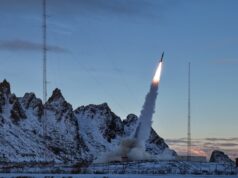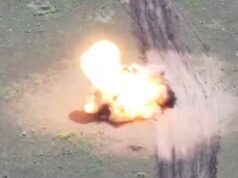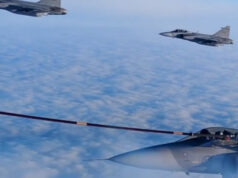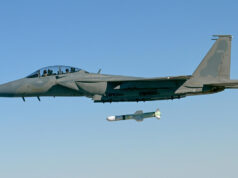The UK government has acquired a semiconductor factory in Newton Aycliffe, County Durham, in a move to strengthen the defence supply chain and support the Armed Forces.
This facility is the only secure site in the UK capable of manufacturing gallium arsenide semiconductors, a vital component in military platforms such as fighter jets.
Defence Secretary John Healey visited the site, which was previously owned by Coherent Inc. and will now be known as Octric Semiconductors UK. The acquisition is expected to secure up to 100 skilled jobs in the North East and safeguard a critical part of the UK’s defence infrastructure.
“Semiconductors are at the forefront of the technology we rely upon today, and will be crucial in securing our military’s capabilities for tomorrow.
This acquisition is a clear signal that our government will back British defence production. We’ll protect and grow our UK Defence supply chain, supporting North East jobs, safeguarding crucial tech for our Armed Forces and boosting our national security.”
Semiconductors are an essential component of modern electronics, from phones and computers to military applications. The government has stated that this acquisition will enhance the UK’s defence capabilities and increase its industrial capacity, with plans to invest further in the facility over the coming years.
The acquisition comes ahead of an Investment Summit aimed at strengthening the UK’s trading relations and supporting high-quality jobs at home.
With global semiconductor demand rising, this move positions the UK to meet future technological needs, including advancements in artificial intelligence, quantum technologies, and 6G.
Background
In 2023, Coherent, the former owner of the Newton Aycliffe semiconductor facility, announced plans to cut over 100 jobs due to a drop in business demand, leaving the future of the site in doubt. With the facility’s long history of ownership changes since it first opened in 1991, there were growing concerns about whether it could continue producing the crucial semiconductor components needed for industries like defence and aerospace.
The recent government acquisition is a key move to secure the future of this vital facility. By stepping in, the government is protecting jobs and ensuring the production of important semiconductors used in military applications, such as boosting fighter jet capabilities. This not only stabilises the plant after last year’s uncertainty but also strengthens the UK’s ability to maintain control over critical technology in the defence sector.














Good news. With recruitment of experienced and qualified management team the company Should do well.
Bad news, we are using the defence budget to buy failing companies on the grounds of “national security”
That’s a very slippery slope.
I’d tend to partly agree.
On the other hand we appear to have woken up to a ‘global supply chain’ particularly for munitions not being a very good idea!
But I agree that if we buy every failing business we create the 1970’s money pit all over again.
It’s not ‘every’ though is it, indeed it’s so far one. I would have been happy if they had bought Sheffield Forgemasters too tbh as it’s the only provider of many vital steel products for defence and have recently developed welding techniques that greatly speed up and reduce costs for Nuclear reactor vessels. I presume RR amongst others will be happy about that. Oh and on that point should we have let RR go to hell in a bucket back in the day? The French on the other hand saved Renault from a similar fate and unlike the ill fated BL mess sensibly guided it to become one of the Worlds premier car companies and great contributors to the national industrial base. Our own much reduced industrial base is one of the major factors in Britains struggle to compete economically on equal terms and holds back potential growth, it has a serious knock on effect throughout the economy and makes us reliant on often costly imports, that financial services etc can’t ever fully compensate for.
Hi Spyinthesky,
Actually MoD does own Sheffield Forgemasters, just search “who owns Sheffield Forgemasters”. Apparently they were acquired back in 2021.
As far as I can tell MoD seems to have a canny investment advisor squirreled somewhere in a backroom.
Cheers CR
They bought it for £2 million and now it has to have £400 million invested. Fingers crossed it works out and the work Forge Masters does is vital but that’s £400 million that could have be spent on ammunition and kit.
The Chinese military spends a lot of time investing in industries. Everything from airlines to luxury hotels and apartment blocks. It’s spends most of it’s time and resources doing this instead of training fight. It’s not a model I think we should emulate.
Does Britain struggle to compete in economic terms? Who are we struggling against? Japan has been in recession for two decades, Germany had a decent run over the past 10 years but its now looking at the kind of structural problems we had in the 70’s. Apparently America is doing well as its debt to GDP ratio passes Italy Canada slowing deflating away as its population heads to the US, Italy is on the verge if ceasing to be an advanced industrial economy and then there’s France.
The IMF has the UK pegged as the second fastest growing economy in the G7 out to 2030 so I struggle to see how we struggle against anyone economically despite what the UK and European media want us to think.
A large part of why we don’t struggle is an unwillingness to prop up failing business with government subsidies.
For every success of government intervention like Rolls Royce I can show you 10 Leylands.
The SNP in particular has a thing for bailouts and everything from Ferguson marine to Prestwick airport has sucked up money and delivered often quite negative results.
Er, they DID buy Sheffield Forgemasters!
Yep the first line of the article says it all.We need to be very careful regards the availability of this sort of kit.
Just need to look at steel production now.
I have mentioned steel on here before. We are going down a crazy route with steel. If you want high quality steel the recipe is fairly simple. A blast furnace, coal, iron ore, limestone. More technical than that I know but that’s the basics. Electric arc furnaces are okay for car parts and washing machines. So any high quality steel will have to be imported very soon. We are then a hostage to events beyond our control.
You also need plants that produce molten iron
Blast furnaces being closed in south Wales and north east by Indian and Chineese owners
My understanding is that electric arc furnaces can be used but not for virgin steel.
However there are newer green technologoies (using Hydrogen in some capacity) that can create virgin steel without the use of coal/coke & would therefore meet the green stategy whilst still maintaining the capability(TPF process or something like that?)
I saw a discussion on some news channel where they were talkng to a German manufacturer about losing that capability in the UK & he was confused as to why ‘we’ were not looking to implement that tech.
I can only assume its to do with the cost – however I have seen others more technical than I suggest the virgin steel it produces isnt actually that good (its rather brittle?)-so maybe its not just the cost?
We need a chem. engineer and or metalurgist on here to explain.
There is a lot of at best misleading information from the tree huggers on this. I am about to oversimplify this but the basics are there. Forgemasters use EAF but they don’t put crap steel in them. They use pig iron and quality pig iron at that. Made with coal and limestone. So basically they are reheating it.
What we are about to do is use EAF using scrap. Typically an EAF will have charge made up of scrap and pig iron that has been made with coal. The higher the scrap content the worse the steel. The pig iron is needed to dilute the impurities in the scrap. Very often copper tin and the like. We will be buying the pig iron from abroad to feed them. So yes we won’t be burning coke / coal but somebody else will on our behalf, to make inferior steel to what we make now. An EAF charged with 100% scrap will produce very poor steel.
The hydrogen furnaces are in early stages. Although at Boden in Sweden a plant should go live next year. It will produce steel with hydrogen which will be made on site in a separate facility. Part of their model is to produce eclectic by solar panel in the south of Europe to power the hydrogen production. Time will tell how that goes.
For me one thing is for sure. Our steel imports are about to go up dramatically.
Ah right thanks for that overview much appreciated.
So in essence the EAF process itself can make high grade steel but only if you use pig iron and its the pig iron that is created by the blast furnaces, which are now closing in the UK- is that correct?
So we could -for example- continue to use the EAF process as we do now but we would need to import the pig iron in order to do so
Why are we not doing that- surely even that will ‘reduce’ our carbon footprint as we are not using our own blast furnaces to create the pig iron.
Does using pig iron in the steel process produce more carbon than by using scrap is that why they are choosing to only use scrap, or is there another reason – for example does transportation of the pig iron cause other issues?
Am I right in thinking its the creation of the initial pig iron whithout using coke that will reduce the carbon footprint and its that which is the ‘aim of the game’ so to speak.
Oh and perhaps we should be looking to use the RR designed small reactor nuclear plants to power our hydrogen based furnaces.
Surely that would also achieve the reduction in carbon the tree huggers desire….I can imagine Miliband frothing at the mouth at that suggestion as we speak😉
Steel production killed by the Tetley tra makers with help from Labour
The fourth pillar of defence is the economic and industrial base of a nation, which we are historically very poor at understanding and protecting.
It didn’t matter quite so much when our economy was comparatively large and our military footprint matched it but it does now.
A good example of what happens when this not fully understood by politicians was the production of heavy calibre guns for battleships post WW1 and armour plate. The two businesses that produced these weapons amalgamated because of a lack of orders and when in the 1930’s we need an uptick it was not possible to increase production quickly enough.
Likewise we had to import armour plate from the Czechs because we didn’t have capacity as we tried to rearm and the Government was forced to intervene to increase capacity.
We are in a far worse position today.
Well said, one might have thought that the lessons of history let alone simple logic might have made that obvious but I fear not. What a lovely future sight to see Tempests stuck on the ground because they don’t have the chips installed to make them functional. The Russians might have the last laugh there. Geez even the Americans were shitting themselves when Apple originally bought the chip company to produce their A-series chips because that company happened to produce the most advanced micro processors for their ICBMs. Indeed they would never have accepted those Arm based chips ever being used if those chips could have been cut off by a foreign company like Arm having the ability to have done so. Pointless spending billions on high tech weaponry if basic elements of it can be cut off, which is why the UK Govt wouldn’t dare refuse licences for F-35 components. Of course we don’t have the clout of the US and thus flexibility in such matters. .
Politicians prefer to pretend that there’s a ‘Peace Dividend’, which would negate the need for such concerns if it could be guaranteed to endure indefinitely. They then try to pretend that said ‘Dividend’ still exists when it doesn’t, because otherwise the realities of national security require them to spend money on things other than their pet projects or bribes for the electorate.
So you want to run a permanent war time economy like North Korea then? 40% of GDP to the military?
You want to start adding up how many chips are inside a tempest and how many suppliers they come from?
This is one small factory, do you really think it’s making a significant number of chips as a percentage of something as complicated as a modern aircraft.
A standard chip fab cost $20 billion to build and has to knock out hundreds of millions of chips to be viable.
Just my standard car has 1500 different chips in it.
It’s a fallacy to think we or anyone else can control modern supply chains.
👍Exactly!
Actually we are very good at this, the RAF and the RN have gone out of their way for centuries (RN) to do preserve and grow the industrial base.
The army is shit at this and always has been.
A few points to consider
It’s the politicians and HM Treasury that are the problem not the armed forces or though the army are pretty useless at this.
Given the importance of GaAs tech to several future military projects, including Tempest I think it is a wise move .
There are several technologies this country needs to have control of.
It probably is but spending our slim defence budget on nationalisation of defence companies should be a last resort and it should be temporary. Companies like BAE and RR can develop sensitive technologies with no government subsidy and the use of a single golden share is more than sufficient for control.
I disagree. Managed properly and given the increasing use of GaAs tech, due to not least its speed and power consumption compared to Silicon , it very probably will pay for itself in the medium to long term.
Well that is perhaps an argument over where the money should come from. however to have no capability to produce these hi tech components would short sightedly leave us in a potentially crippled state to defend ourselves without others control over it or even military exports, which would be beyond short sighted in the present environment let alone future unknowns. I note you said previously that Ai and hypersonics were gimmicks, sorry but these comments sound so 1st WW cavalry officer stuff that doesn’t seem to fit with much of your otherwise sensible views on matters, so it really confuses me. In what world would we want to be in a position where all our military grade micro processors come from Taiwan, South Korea, European countries or the US. In any large scale conflict they may be taken out of action altogether or be required to supply their own production needs. If we got any it would be at extravagant costs to feed their own cost of production.
It would be akin to have been reliant on Oerlikon, Bofors, Bren, Hispano-Suiza et al being supplied to us in war time or relying on those already supplied, geez two of those started out as predominantly German controlled businesses, or in the case of Bofors were not allowed to sell German derived guns to the Allied Nations into the thirties. As Russia is finding with its airline business amongst others, only having access to non locally built but vital technology through the Black market is deeply debilitating and costly.
Do we actually know where the money is coming from? Jim said ‘we are using the defence budget to buy failing companies on the grounds of “national security”’ but I see 2 things in this article, the report that the government is buying a company and an awful lot of mentions of defence applications of that company’s products.
While the funds for this acquisition might be coming from the defence budget I don’t see that explicitly stated in this article and, unless other reporting is definitively stating that the defence budget is the source of the funding, then I think it is entirely possible that the funds for this are coming from some other government budget.
HMG has bought significant stakes in other companies in the not too distant past, e.g. OneWeb that I’m pretty sure wasn’t funded from the defence budget, so clearly there are other budgets available to fund government investment in commercial companies.
If you search “who owns Sheffield Forgemasters” the page comes up with MoD all over it so I think it is fair to assume that the MoD has paid for these companies. However, I would hope that the MoD benefits from any dividends payable…
Cheers CR
Straight into the Treasury coffers, do not pass go.
It can be counted as defence expenditure under NATO rules and out budget is right on the NATO floor so even if it comes from another department it will be counted against our defence spending just as with Ukraine aid and the MOD budget will be changed accordingly.
It’s not really a fair comparison in that semi conductors are so expensive to build at scale and so ubiquitous in every product that not even the USA has the capability for internalisation of the supply chain.
Maybe at a NATO + level adding in the likes of Japan and South Korea we can do this and if this factory is part of an overall plan like that then it’s worth it but on its own it’s not doing anything.
Big questions like why did it go bust and what does no one else suitable want to buy it are the questions that need to be asked.
Maybe we should ask the Chinese,they like to buy semi-conductors..maybe they know something we don’t.
It would save em invading Tiawan I suppose
The US internalisation has started with the Chips Act which led TSMC and Intel to build state of the art fabrication plants within the continental USA.
The semiconductor eco system is deep and complex but the gravitational effect of multiple new builds is big and sucks in a lot, especially when USA had many chip fans before.
So it might not achieve a sovereign capability for all situations but it will make a big difference and encourage TSMC not to be Taiwan only..
Strategy investment
If we have low production order it sustains skills and capabilities. Vital we have this. You can’t buy stuff from the Chinese if you are arming to fight against them. Not everything has to be private , some key industries need to be owned by the government. Other countries protect key infrastructure.
Can you point to the civil servant or politician in charge in Whitehall who knows anything about semi conductors?
As a general rule government should avoid industry.
Since they allowed ARM to be bought, that evidenced no understanding.
Yeah apparently the Torys said the sale “Showed Britain was still open for business after Brexit” (not sure who quoted that may have been Gove?).
But yes another example one of many that over the years has squandered much of our technological advantages.
The US and Netherlands already agreed not to sell key x-ray lithography tools, critical for high performance chips, to the CCP.
So CCP will be stuck on commodity mid range chips until they work out lithography for themselves. Not a problem if you make washing machines and low end smartphones..
However CCP does have leverage on rare earth metals supply required for high technology products. So prices may go up as CCP decides to keep those for themselves.
Alternative sources and freedom from coercive relationships that restrict supply require attention… Belt and Road, bad!
Where has it said we are using the ‘Defence Budget’ to purchase it?
It’s not a failing company, it is a tiny part of a huge US company that has just lost an enormous Apple contract and is looking to rationalise its global footprint.
Or may be not. We need to build our industrial base otherwise not only will defence suffer but also the countries wealth. What we now need to do is make it a proper going concern and if that means the government spending some money to invest that is not a slippery slop.
Excellent. Just like the MOD purchase of Sheffield Forgemasters, this will protect our defence industrial base. It must be obvious even to those most wedded to market forces that a small country like UK has to have control and ownership of critical capabilities. If we don’t, the subsidized US defence companies, enjoying legal monopoly of the US defence market, will become even more dominant.
Sadly judging by some comments here it’s not so obvious and that stuns me that people don’t understand the importance of such technologies and why other countries are spending billions just trying to jump on the bandwagon of technology we already possess. Jeez even China is frantically trying to attain self sufficiency in micro processor technology so much of which is under western control
I think people are pointing out that it is a mixed blessing. Yes we need these industries not to be dependent on China, but on the other side we are both broke and the British Govt doesn’t exactly have a stellar record in managing Nationalized Companies.
Now we have Labour in charge
America has Bob hope Johnny Cash and Biden
We have no hope, no cash and Starmer
Completely agree! Commercial priorities will always take production to a cheaper (read abroad) places. See Tata Steel and we now can’t produce virgin steel that is needed for defence and other needs. If India has a opposing view to us they can easily choke off supply. This is just one scenarios for one industry. Else china will buy it up cheap and then copy the IP and look to sell it to us (or not) as it chooses – see rare earths restrictions).
About time. Previously quite a few defence establishments were government owned. Government does not need to run such sites (they are particularly bad at it), but if they own it, they get to decide who runs it & what the rules are.
The French manage such matters so much better than us, they have a water company that owns large parts of Hollywood for heaven sake. It’s how you manage things that’s important rather than taking ill conceived political (too often party political) stances on the matter that refuse to take an objective view.
We make poor quality loose money and are full of leaks
Interesting.
MoD owned?
“ including advancements in artificial intelligence, quantum technologies, and 6G.”
Brave statement as nobody has defined what 6G is yet!
No one has really defined a 6th Gen fighter yet but hey we are designing one, which I guess is the point you don’t wait until what is an understandably nebulous concept to be set in actual concrete before you start imagining it in reality even if it changes along the way. Fact is whatever 6G becomes it will rely on very advanced chip technology, it may be a little chicken and egg but you don’t get there unless both are developed to enable the other. Software both dictates and is dictated by the hardware, TSMC dominates the Arm chip manufacturing sector because it committed to it before the World was ready to commit. Britain has fallen behind in many technologies because we waited to see what’s happening too long instead of trying to help dictate them as we once did.
Fact is advanced chips will be at the core of all those developments which will all feature in military technology, it’s only the details that are up for debate and you don’t wait for that debate to conclude before preparing and working towards it. The success of Arm in fact proves that point, it worked for over twenty years on RISC processors originally as a tiny computer company when so many said how can you compete with Intels and the Worlds reliance on CISC design concepts. Shows what can be done with the right commitment and faith. Good job they didn’t stand back and wait for complete answers to complex questions.
It is a little bit different with telecoms like 6G which are agreed to international standards!
6th gen fighters are built to the most advanced achievable and affordable tech.
6G has to be cheap to bulk manufacture and install across the world.
I’m bemused about this semiconductor plant as I didn’t think it had the most recent generation of fabrication tech.
But it appears to have quietly been doing military fabrication for a long time.
It doesn’t it has been described as aging and the prior owners were going to close it down if a buyer couldn’t be found after losing a big contract with Apple.
Probably a sensible way to go, in reality semi conductors are a massive western nation supply chain weakness..one in which any war with china over Taiwan would be a major problem.
china has been hammering away at the semi conductors market really hitting other nations market share of the business..it’s basically upped its segment of the market by 62% over the last year, Korea is down 20%, Taiwan is down 31%, U.S. down 19%, Europe down 41%.
when you think around 80% of the Market share in semiconductor sales sits with china, Korea and Taiwan..any western pacific war will essentially kill the supply chain…semi conductor rationing would be a thing.
Someone who gets it, the MoD and Govt takes a whacking on here for its short sightedness, sadly that quality goes far deeper, as even as we see on UKDJ there are strong indications.
Yup, very good point.
Any large scale war in the future would be all about industrial capacity something our politicians are rediscovering in Ukraine.
However, the lessons were already there to learn. Germany’s Spring Offensive in WW1 was defeated by the industrial response of the Western Allies. In the UK General Haig issued a call for support on the home front. It was answered in some style as production of everything from SE5a fighters to coal shot up – with production records being broken all over the place. In Germany, industrial output fell as the population were starving and revolution was taking hold…
Come the Allies Autumn Counter Offensive supplies were no issue… The rest, as they say, is history.
History has a lot to teach us.
Cheers CR
PS. Perhaps a bit of an over simplification, but the essence is there.
Most people really have no idea what the idea of war means to the Chinese. I cannot remember exactly how many it was but the Chinese war book contains between 50-70 types of warfare it engages in…and most of that it does all the time..it does not believe in the concept of peace and war as different states..to china war is not the continuation of politics by other means..that’s very western…to china politics is simply the continuation of war by other means..as is everything else…the CCP has a uniquely warlike take on the world..it just believes that kinetic military operations are right at the end and just one part of the picture.
China is always on the attack:
1) internal politics..making sure it’s own population gets what the fight is and is behind the struggle ( internal security and unity win wars..disunity and poor internal security loss wars).
2) strengthening the political power of the government..all agencies including the PLAN are fundamentally there to strengthen the political power of the CCP and leader.
2) attacking the will of opposition populations ..splitting and causing internal disputes within populations, mistrust of leaders, governments and all agencies that make up the nation ( police, health, social, business, military, political leaders, religion, sex..anything infact)
3) destroy the will of the enemy political classes..split them apart..split them from the population..sow distrust ( just look at the US election..classic example of the outcomes of political warfare attacks).
4) gain traction in and control the ways of engaging in political warfare..and control of any possible access to your own population, political leaders and institutions of society ( every Chinese company anywhere has a shadow board of CCP members ready to take control at any time).
5) subvert friendships and Alliances through any and all means ( wolf warrior diplomacy )
6) control governments via loans and other leavers.
7) control supply lines of raw materials via stock piling, limiting access to raw materials in open markets and controlling supplies.
8) subverting and destroying enemy supply chains..removing production of key parts from enemy supply chain by “dumping” ( selling below or at near cost).
9) aggressive use of debt to control or buy required materials or destroy supply chains via dumping.
10) development and control of markets…the more people you can control the market share of products to the better. This includes active laws and trade wars
11) stealing any and all science and technology to get ahead..massive investment in other enemy nations science and tec to gain access to and possibly control.
12) investment in specific enemy infrastructure…to gain access and control as well as political leverage..those you employee you can influence..those that ow you or need you you can influence.
13 legal control…influence and us laws to your own advantage…tie your enemies in a legal quagmire..
That’s just a small part of how china wages war..before we get to the more robust..active cyber attacks, providing your enemies enemies with stuff, supporting terror activities, using sub war violence such as Chinese CCP members using violence and intimidation one the streets of enemy nations, coastguard cutters ramming etc…
The west needs to start attacking back and defending properly against all of this…the problem is that morally not where we are and it would impact on our lives and freedoms….but China has accepted the loss of 1-2% growth to engage in these levels of war with the west and the population a massive loss of freedom.
Great summary.
Hybrid warfare or just business?
Without the long term emergence of capitalism in the west, CCP is free to structure itself with clarity and purpose.
Ultimately it’s about values, and there we will always differ. That difference has costs that we must pay. The price of freedom being the most obvious.
That will be the first thing the Tories sell off at a knock down price as soon as they get back into power.
Neither Conservative nor Labour ( new or old) have shown any long term competence at protecting the defence industrial base. In manufacturing generally, new labour oversaw a bigger loss of manufacturing jobs than the Thatcher/Major governments.
But there are some signs that even the hapless dimwits in Westminster have begun to understand.
Wishful thinking more like
Ukraine..!
It’s the one can they cannot kick down the road. Although to be fair it is also the one can that they all seem to agree on. Which is a bit sad really given that so many of our country’s ills could be sorted with a bit of common sense and cross party consensus.
Oh well…
Cheers CR
Who had the foresight to buy Sheffield Forgemasters, then?
Did they finely sell off S.F ?
If the tories do plan to sell strategic industries off in the future, they are obviously PRC/CCP agents really.
One moment of common sense doth not make a less clueless government.
The stories did sell off the DRA who were making a tidy sum for the U.K. government selling parents.
Btw you have them to thank for Flat screen TVs
Sheffield steel master was bought back under Tory watch, but yes look at sales by prior chancellors, tory or labour both as bad as each other.
Maybe the government should take back the GPSS. From what i hav3 read, the goverment sold it for 85 million to a Spanish firm (CHL) and charge the MOD nearly 240 million to use. We do need prorect semiconductor manufacturing in the UK.
It’s sadly becoming a trend that the last factory in the UK manufacturing XXX has to be nationalised to stop it closing or falling into Chinese ownership. The next big call is H&W and FSS. Navantia wants to build the ships in Spain, but if suitably incentivised it will take over the H&W Belfast shipyard where nearly half the work was to be undertaken. However, it has no interest in the other companies/shipyards in the H&W Group. It’s a tough call for the MOD and the government – a retender will almost certainly result in the hulls being built in South Korea, albeit at probably a lower price and more quickly.
Isn’t Babcock the most likely candidate for a H&W takeover? If they bought even just the Belfast yard, then they would become the preferred bidder for all future RN and RFA vessels bar the tier one escorts (which BAE will likely remain the builder of).
As long as Babcock still thinks there is profit to be made in shipbuilding, then they have good reason to pursue a H&W takeover in my opinion.
Thank you for telling everyone where it is and how important it is.
Well done
Where do you get the wafers from? Japan.
Mr Whippy …is he still going round or has that been sold off as well now?
People on here talk of strategic industries. The steel works in Port Talbot was one of those. 80 inch rolling mill capable producing steel for ships and tanks. Now thanks to the Tetley tea folk they are now relegated to refrigerators and washing machines, you don’t need an 80 inch mill for that. The predicted electric arc furnace has gone from Three years to four
How long before they pull the plug on that. They have stated they will import slabs to finish here. Teafolk TaTa